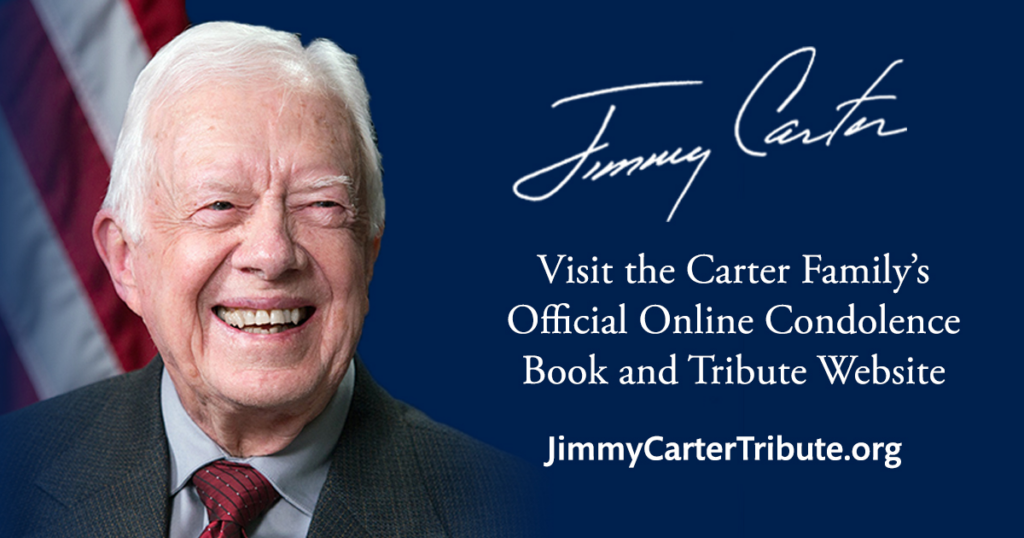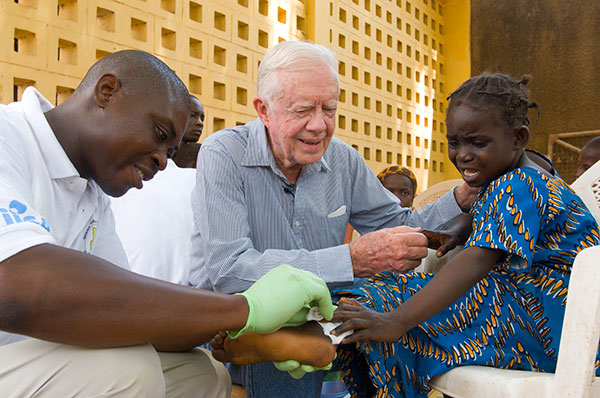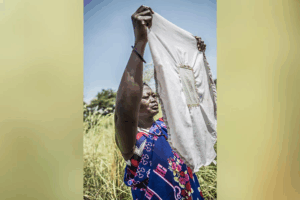
The bond of our common humanity is stronger than the divisiveness of our fears and prejudices. God gives us the capacity for choice. We can choose to alleviate suffering. We can choose to work together for peace. We can make these changes – and we must.
— Jimmy Carter Nobel Lecture, 2002
President Jimmy Carter died at age 100 on Sunday, December 29, 2024 at his home in Georgia. What follows are excerpts from The Carter Center’s tribute related to his work in global humanitarian healthcare:

“Since its founding, the nonpartisan, not-for-profit Center has had numerous achievements: leading the international campaign to eradicate Guinea worm disease, which has reduced cases by more than 99.99 percent; helping establish grassroots health care delivery systems in thousands of communities in Africa; observing more than 110 elections in 40 countries; furthering avenues to peace in Ethiopia, Eritrea, Liberia, Sudan, Uganda, the Korean Peninsula, Haiti, and Bosnia and Herzegovina; expanding efforts to diminish stigma against people with mental illness; and strengthening international standards for human rights.
“In 2002, during the 20th anniversary year of the Carter Center’s founding, President Carter was awarded the Nobel Peace Prize “for his decades of untiring effort to find peaceful solutions to international conflicts, to advance democracy and human rights, and to promote economic and social development.”

“Through its health programs, the Center has advanced disease prevention and agriculture in the developing world. Its campaign to eradicate Guinea worm disease was launched in 1986 when the disease afflicted an estimated 3.5 million people. By 2022, the Center and its partners had reduced the number of cases to 13. The Center also works on regional control and elimination of diseases such as river blindness (onchocerciasis), which affects nearly 18 million people in the Americas and Africa. River blindness is preventable through annual treatment with the medicine Mectizan®, donated by Merck. The Center has distributed more than 455 million treatments of Mectizan worldwide since the River Blindness Elimination Program began in 1996. In the Americas, the Center is working with ministries of health in affected endemic countries to halt transmission of the disease.
“The Carter Center also targets four other tropical diseases: trachoma, malaria, lymphatic filariasis, and schistosomiasis. In the United States, as well as abroad, the Center strives to reduce the stigma of mental illness and improve access to and the quality of mental health care.”
You can visit www.jimmycartertribute.org to make a memorial gift, sign a virtual condolence book, and learn more.

Jimmy Carter, who passed away at 100, devoted five decades after his presidency to tackling neglected tropical diseases and improving healthcare access in the world’s poorest regions. Working alongside his wife Rosalynn through the Carter Center, he helped nearly eliminate Guinea worm disease, reducing cases from 3.5 million in 1986 to just 11 in 2024.
Carter’s approach revolutionized global health initiatives by emphasizing local leadership and community ownership of health projects. He leveraged his status as a former president to negotiate with world leaders, broker crucial pharmaceutical partnerships, and even arrange cease-fires to enable healthcare workers to reach conflict zones.
His work influenced major philanthropic efforts, including the Gates Foundation, and established new standards for how aid organizations engage with recipient countries. Rather than imposing solutions, the Carter Center became known for letting beneficiaries set priorities and lead projects.
The impact was particularly significant in fighting diseases that affected the most marginalized populations. Carter brokered agreements with pharmaceutical companies to donate medications for river blindness and lymphatic filariasis, creating sustainable treatment programs in remote communities.
“We believe access to health care is a human right, especially among poor people afflicted with disease who are forgotten, ignored and often without hope,” Carter wrote in 2001 after lobbying Latin American leaders on neglected diseases. “Just to know that someone cares about them not only can ease their physical pain but also remove an element of alienation and anger that can lead to hatred and violence.”
Read the full article by Stephanie Nolen from The New York Times (gift article): Jimmy Carter’s Quiet but Monumental Work in Global Health
Watch this video about Jimmy Carter’s life:
And this video, in the President’s own words:
Related Articles

Eradicating Guinea Worm Disease: A Story of Hope, Partnership, and Persistence
A new documentary chronicles President Jimmy Carter’s nearly four-decade campaign to eliminate guinea worm disease—an ancient parasite that once afflicted millions—using education and clean water rather than vaccines or medication.

All Eyes on Remote Uganda
At the River Kayo, Ugandan Ministry of Health and Carter Center staff are carefully monitoring the black flies that breed in its waters for evidence of the parasite that causes onchocerciasis.

Only 15 Guinea Worm Cases Reported Last Year
The prospect of eradicating Guinea worm disease remains on track, with just 15 human cases reported in two countries in 2024, reports The Carter Center.
